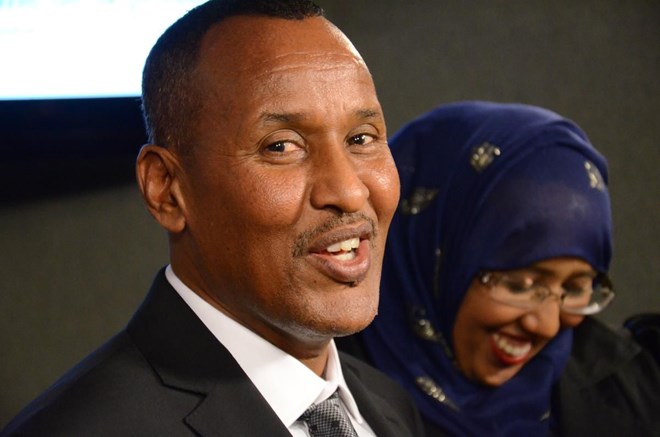
Wednesday May 23, 2018

Bashir Makhtal is a Canadian citizen who was detained in an Ethiopian prison for more than 11 years until his release in April, 2018. He spoke with the media in Ottawa on May 22, 2018, joined by his wife Asiso Abdi. (BRUCE CAMPION-SMITH / TORONTO STAR)
OTTAWA—A Canadian man who was jailed in Ethiopia for 11 years is calling for an investigation into the federal government’s handling of his case, which began as he fled war-ravaged Somalia in 2006 and ended with his long-sought return to Canada last month.
Bashir Makhtal made the call for an inquiry on Parliament Hill Tuesday, when he recounted how he endured years of solitary confinement and abuse during his imprisonment in Ethiopia, where he was convicted of terrorism and sentenced to life in jail in 2009.
Makhtal has always maintained his innocence, and alleged Tuesday that Canada’s consular service missed opportunities to help him as human rights advocates and his family pushed for years to secure his release.
“Because I could not get help from the Canadian government at the time I needed it, I accepted death,” said Makthal, 49.
“I want to know if the Canadian government knowingly neglected my case.”
Adam Austen, spokesperson to Foreign Affairs Minister Chrystia Freeland, said in an emailed statement that the government welcomes Ethiopia’s decision last month to pardon and release Makhtal. Austen said that Freeland’s parliamentary secretary, Mississauga MP Omar Alghabra, visited Makhtal in Ethiopia and met with him again in Ottawa on Tuesday.
He did not say whether the government would consider launching an investigation into Makhtal’s case.
“We are always looking for ways to improve Canada’s consular services. This includes listening to recommendations on consular services from Canadians who have faced difficulties abroad — as Mr. Alghabra is doing today — as well as to views from civil society,” Austen said.
“There is nothing more important to this government than the safety and security of Canadians.”
Makhtal — who was born in Ethiopia and moved to neighbouring Somalia when he was 7 — emigrated to Canada in 1991, became a citizen in 1994 and lived in Toronto, where he worked as a computer technician for CIBC. He later took a job in Djibouti with his friend’s clothing company, and frequently travelled between Canada and Africa, he said.
He was in Somalia in 2006 when violence in the capital forced him to flee by land to Kenya, where he was arrested at the border on New Year’s Eve. He initially figured he was being detained for routine processing along with several others, but said that he grew concerned when he was transferred to Nairobi and questioned by agents from Ethiopia — a country he hadn’t visited since he was a boy.
He notified Canadian consular staff in Kenya, who visited him in his cell and wrote a letter on his behalf, he said. But it wasn’t enough to prevent him being deported to Ethiopia three weeks later. Makhtal said he managed to get a cellphone from a fellow prisoner to call his wife and lawyer and tell them what was happening, and said he was severely beaten when he initially refused to board the plane that took him to Ethiopia.
He was held for long periods of solitary confinement “in horrific, inhuman conditions,” he said, describing his cell as a small, underground room with a floor that was often wet. He said he was frequently woken in the middle of the night for questioning, alleging officials wanted to turn him into a collaborator against ethnic Somali people in the oil-rich Ogaden region of the country.
Makhtal’s grandfather co-founded the Ogaden National Liberation Front, a group that was formed to push for independence and is considered a terrorist organization by the Ethiopian government.
In 2009, after two years of imprisonment in Ethiopia, Makhtal was convicted of terrorism for alleged links to the group — charges that Makhtal and his family have always denied. Meanwhile, in Canada, his wife and family campaigned for his release, while his lawyer Lorne Waldeman and Amnesty International repeatedly urged Ottawa to intervene on his behalf.
In the end, after deals to secure his release failed to materialized under the previous Conservative government, Waldeman said that Prime Minister Justin Trudeau’s involvement in the case was a large factor in securing Makhtal’s release on April 18. He arrived back in Canada three days later.
“We are together, and we have to start our life again,” Makhtal said, speaking to reporters Tuesday next to his wife, Asiso Abdi.
“We lost half of our life,” he said. “We’re going to pick up whatever is left over.”